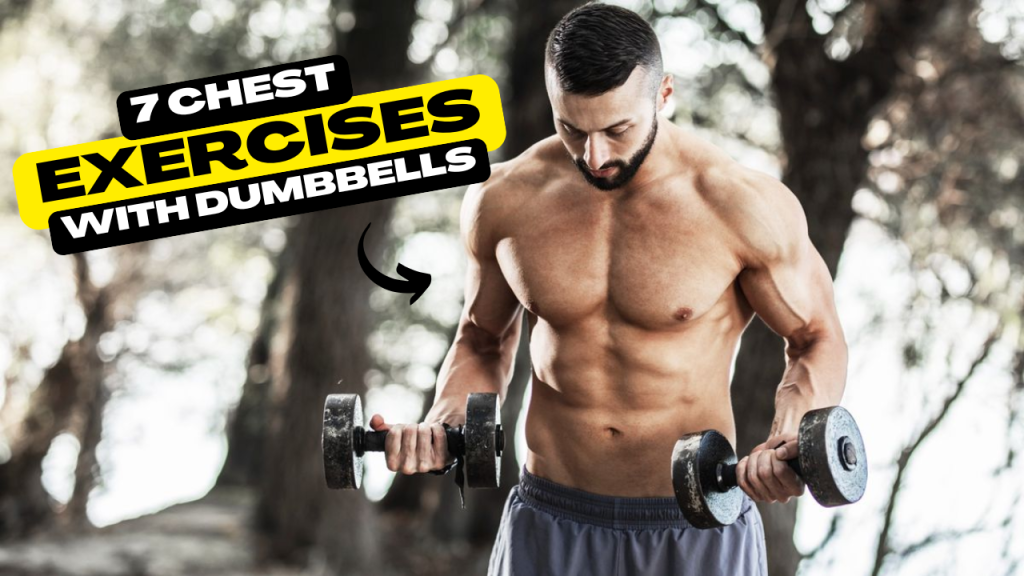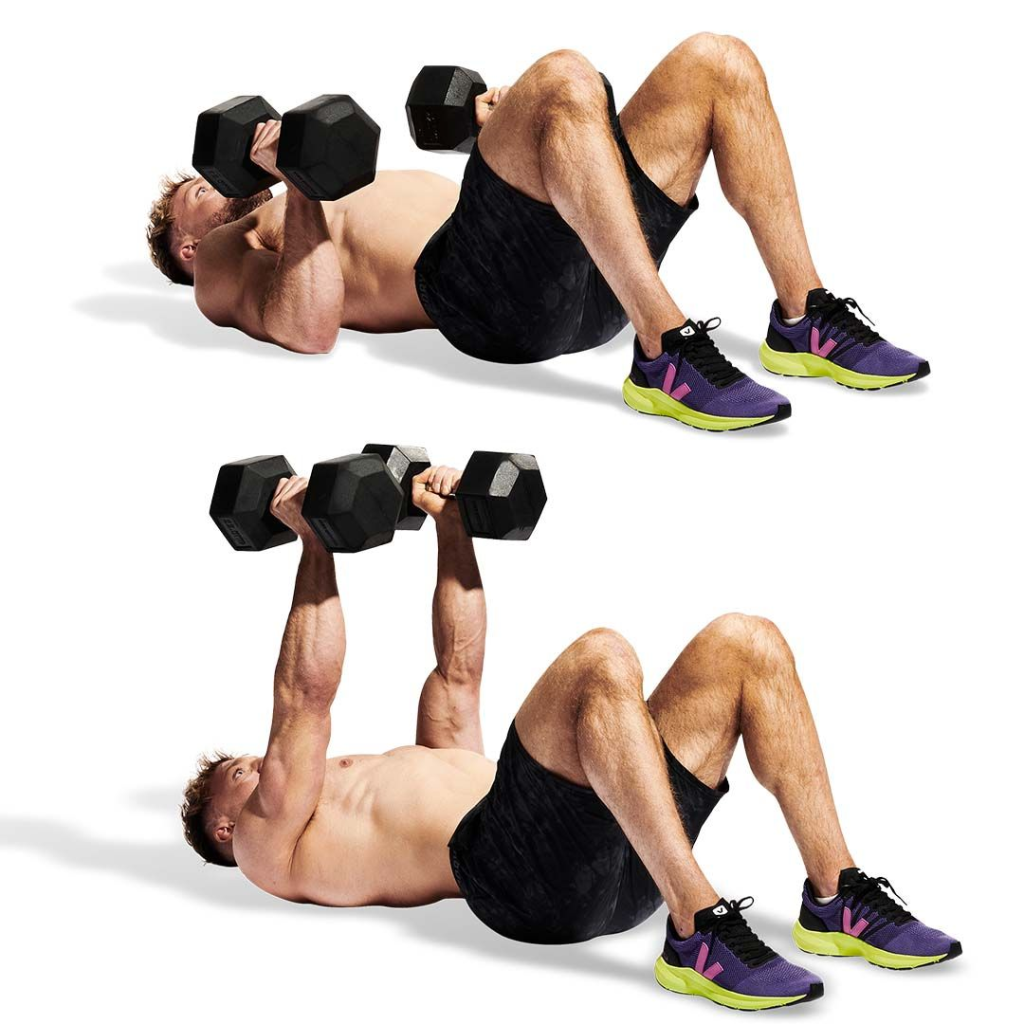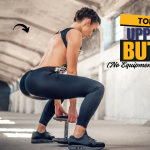Are you tired of crowded gyms and bulky machines? What if we told you that all you need is a pair of dumbbells to sculpt a powerful, defined chest—right from your living room? That’s right. Dumbbells are not only convenient, but they’re also incredibly effective in building strength, balance, and symmetry in your chest muscles.
In this guide, we’ll break down 7 highly effective chest exercises with dumbbells. Whether you’re a beginner or looking to diversify your routine, these exercises can help you build a strong and well-defined chest with minimal equipment.

Table of Contents
Perks of Chest Exercises with Dumbbells
- Improved Muscle Symmetry
- Dumbbells work each side of the chest independently, correcting imbalances.
- Greater Range of Motion
- Unlike machines or barbells, dumbbells allow a deeper stretch and better contraction.
- Enhanced Stabilizer Muscle Activation
- Engages smaller supporting muscles for better overall strength and control.
- Better Joint Safety and Flexibility
- Allows natural movement patterns that reduce the risk of shoulder or wrist injuries.
- Versatility and Convenience
- Perform multiple exercises without needing machines or large spaces—perfect for home workouts.
- Functional Strength Development
- Builds strength that translates into real-life movements and sports performance.
- Balanced Chest Development
- By changing angles (flat, incline, decline), you can target upper, middle, and lower chest efficiently.
- More Core Engagement
- Many dumbbell exercises activate the core, especially when performed without back support.
- Progressive Overload Friendly
- Easy to scale up intensity by increasing weight or reps over time.
- Time-Efficient Workouts
- You can hit all parts of the chest in less time using compound and isolation movements with dumbbells.
Do’s and Don’ts of Dumbbell Chest Workouts
| Do’s | Don’ts |
|---|---|
| Warm up properly before lifting | Don’t lift heavy weights without proper form |
| Use a full range of motion | Don’t rush through reps |
| Keep your core engaged | Don’t arch your lower back excessively |
| Maintain control during each rep | Don’t drop the dumbbells at the bottom of the rep |
| Focus on muscle-mind connection | Don’t let momentum do the work |
| Start with lighter weights if you’re a beginner | Don’t ego-lift to impress |
| Breathe steadily—inhale down, exhale up | Don’t hold your breath while pressing |
| Use a mirror or film yourself for form check | Don’t ignore signs of pain or discomfort |
| Include variation (flat, incline, flys, etc.) | Don’t overtrain—allow chest muscles to recover |
| Progress gradually (weight, reps, tempo) | Don’t neglect other push muscles like shoulders/triceps |
What Can Happen After 30 Days of Dumbbell Chest Exercises
| Category | Changes You May Notice |
|---|---|
| Muscle Development | Noticeable increase in chest definition and fullness |
| Fat Loss (with diet) | Reduction in upper body fat, making chest muscles more visible |
| Strength Gains | Improved ability to lift heavier dumbbells with better control |
| Muscle Symmetry | More balanced chest development (especially if one side was weaker) |
| Form & Technique | Better control, posture, and exercise execution due to muscle memory |
| Posture | Improved upper body posture from stronger pecs and stabilizers |
| Endurance | Increased workout stamina and ability to complete more reps without fatigue |
| Mind-Muscle Connection | Enhanced ability to feel and target the chest during each rep |
| Confidence Boost | Feeling stronger and more confident in your body and workouts |
| Injury Prevention | Stronger supporting muscles reduce risk of shoulder or chest-related injuries |
Why Dumbbells for Chest Workouts?
Dumbbells offer a greater range of motion, help fix muscular imbalances, and activate stabilizer muscles more than machines or barbells. Plus, they’re versatile and suitable for small spaces, making them ideal for home workouts.
Benefits of Dumbbell Chest Exercises:
- Improve muscle symmetry
- Enhance core stability
- Reduce injury risk
- Allow for versatile training angles
7 Best Chest Exercises with Dumbbells
1. Flat Dumbbell Bench Press

Muscles Targeted: Pectoralis major, triceps, anterior deltoids
How to Do It:
- Lie flat on a bench, dumbbells in each hand.
- Press the dumbbells upward until the arms are fully extended.
- Lower slowly, feeling the stretch in your chest. Pro Tip: Keep your wrists neutral and avoid locking elbows at the top.
2. Incline Dumbbell Press

Muscles Targeted: Upper chest, shoulders
How to Do It:
- Adjust the bench to a 30–45° incline.
- Hold dumbbells at shoulder level.
- Press up until arms are extended, then lower with control. Unique Twist: Pause for a second at the top to engage the upper chest further.
3. Decline Dumbbell Press

Muscles Targeted: Lower pectorals
How to Do It:
- Set the bench to a decline.
- Press dumbbells from chest level to directly above.
- Slowly bring them back down without letting elbows flare out too much. Tip: Helps to add fullness to the lower chest area.
4. Dumbbell Chest Fly

Muscles Targeted: Inner chest, pectorals
How to Do It:
- Lie on a flat bench with arms extended above your chest.
- Lower dumbbells in an arc, keeping a slight bend in elbows.
- Return to the start position in the same arc. It is also known as dumbbell pec fly.
5. Incline Dumbbell Fly

Muscles Targeted: Upper chest
How to Do It:
- Use an incline bench and perform the fly with the same arc motion.
- Focus on squeezing your upper chest at the top. Why It’s Effective: Stretches and targets the often-underdeveloped upper chest.
6. Dumbbell Pullover

Muscles Targeted: Chest and lats
How to Do It:
- Lie flat with one dumbbell held with both hands.
- Lower the dumbbell behind your head, then pull it back above your chest. Added Benefit: Improves rib cage expansion and flexibility.
7. Dumbbell Squeeze Press

Muscles Targeted: Inner chest
How to Do It:
- Hold two dumbbells together over your chest, palms facing each other.
- Press them upward while squeezing them together.
- Lower under control, maintaining tension between the dumbbells. Why It’s Unique: The constant tension hits the inner chest hard.
Weekly Routine
Day 1 – Chest Focus (Push Day):
- Flat Dumbbell Bench Press – 4 sets x 8-10 reps
- Incline Dumbbell Press – 3 sets x 10 reps
- Dumbbell Chest Fly – 3 sets x 12 reps
Day 4 – Upper Body Burnout:
- Dumbbell Squeeze Press – 3 sets x 10-12 reps
- Dumbbell Pullover – 3 sets x 12 reps
- Decline Dumbbell Press – 3 sets x 8-10 reps
Mistakes to Avoid
- Going too heavy: This can limit the range of motion and increase injury risk.
- Not controlling the movement: Dumbbell exercises are best performed slowly.
- Incorrect bench angles: Ensure proper form to avoid shoulder strain.
Final Tips for Maximizing Gains
- Progressive overload is key. Gradually increase weights or reps.
- Don’t skip warm-ups. A few light sets can prep your muscles and prevent injury.
- Pair with proper nutrition. Protein intake supports muscle repair and growth.
- Allow 48 hours of recovery between chest workouts to maximize hypertrophy.
Conclusion
Dumbbells are a powerhouse tool when it comes to building a bigger, stronger, and more defined chest. With just these 7 dumbbell chest exercises, you can level up your upper body workouts whether you’re training at home or the gym. Consistency, proper form, and a focus on muscle-mind connection will bring the best results.
Ready to ditch the machines and lift smart with dumbbells? Save this guide and make chest day your best day.
Frequently Asked Questions (FAQs)
Can I build a bigger chest using only dumbbells?
Yes. Dumbbells are highly effective for building chest size and strength. With proper technique, progressive overload, and consistency, you can develop a well-defined and muscular chest without needing machines or barbells.
How often should I do chest exercises with dumbbells?
2 times per week is ideal for most people. Ensure at least 48 hours of rest between chest-focused workouts to allow for muscle recovery and growth.
Do I need a bench to do chest workouts with dumbbells?
A bench adds variety (flat, incline, decline), but it’s not mandatory. You can modify most exercises (like floor presses or floor flys) to perform them effectively on the ground.
What weight dumbbells should I start with?
Beginners can start with 8–15 lbs (4–7 kg) and gradually increase based on strength and comfort. Focus on form over heavy lifting, especially in the beginning.
Can I do these dumbbell chest workouts at home?
Absolutely. All exercises listed can be done at home with a set of dumbbells and an optional bench or mat. It’s one of the most space-efficient routines for upper body training.
How long until I see results from dumbbell chest workouts?
Most people notice visible results in 3–4 weeks, including better definition, strength, and endurance—especially when paired with proper nutrition and rest.
Are dumbbell flys safe for shoulders?
Yes, if performed with proper form and moderate weight. Keep a slight bend in the elbows and avoid overstretching. If you feel discomfort, reduce the weight or switch to presses.
Can I combine these with other push-day exercises?
Yes. These dumbbell chest exercises pair well with shoulder presses, triceps dips, or push-ups as part of a push-day workout split.





